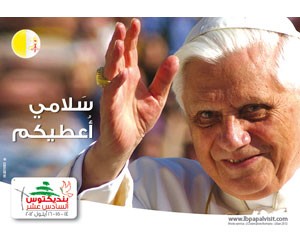 The civil war in Syria will cast a long shadow on Pope Benedict’s trip to neighboring Lebanon next weekend but the Vatican is “tranquil” about his security after receiving guarantees from the country’s fractious religious groups, the papal envoy to Beirut said on Monday.
The civil war in Syria will cast a long shadow on Pope Benedict’s trip to neighboring Lebanon next weekend but the Vatican is “tranquil” about his security after receiving guarantees from the country’s fractious religious groups, the papal envoy to Beirut said on Monday.
Archbishop Gabriele Caccia told Reuters he hoped the situation in Syria would not drown out the main purpose of the trip – to focus attention on the problems and aspirations of the entire Middle East.
“You certainly can’t close your eyes to a situation of violence. The drama in Syria looms over this trip but there is also the wider horizon of the Middle East,” Caccia said in a telephone interview from Beirut.
“The Syrian question takes priority because it is an emergency but the whole trip cannot be reduced to a political question regarding Syria,” he said.
There are fears that the Syrian conflict could spill over into Lebanon and reignite civil war among the country’s rival religious groups. Lebanon’s population is 60 percent Muslim with the rest almost all Christian.
While there have been fears in some quarters that the papal trip is too dangerous, Caccia said “I am as tranquil as humanly possible” and the Church had “reasonable guarantees” that the visit would not be disrupted.
“Clearly security forces are on alert. Security is always a priority during papal visits, particularly in this (regional) context, which is a heated one,” he said.
“But I must honestly say that as far as the Lebanese components are concerned, no sector has expressed opposition to this trip. All the communities – Christians, Muslims, Sunni, Shi’ite, Druze and Alawites – have reacted positively to the trip.”
HEZBOLLAH ON BOARD
In an interview with Reuters last week Lebanese Prime Minister Najib Mikati said Lebanon’s religious communities, who fought a 15-year civil war ending in 1990, will “all drown” if they let Syria’s civil strife spill over the border.
Many Sunni Muslims in Lebanon actively support the mainly Sunni revolt against Syrian President Bashar al-Assad, a member of the minority Alawite faith which has links to Shi’ite Islam. Lebanese Shi’ites, among them the militant group Hezbollah, have mostly backed Assad.
Caccia said a delegation from Hezbollah visited Lebanon’s Maronite Christian patriarch recently and “expressed joy” at the pope’s trip.
“There have been contacts all around from the start. We always have to be alert because terrorist plots are a danger for all societies and the whole world. But the current context seems to give us reasonable guarantees, otherwise the trip would not have gone ahead,” he said.
Fighting in the northern city of Tripoli between an Alawite minority and a Sunni Muslim majority has rekindled fears of renewed strife in Lebanon, which endured a bloody civil war from 1975-1990 in which Israel, Syria, Iran and the Palestinians all used as a proxy battleground.
Benedict, on his 24th trip outside Italy since his election in 2005, is making the three-day visit to issue a document known as a “apostolic exhortation” based on the results of a synod of Catholic bishops on the Middle East in 2010.
HEZBOLLAH ON BOARD
In an interview with Reuters last week Lebanese Prime Minister Najib Mikati said Lebanon’s religious communities, who fought a 15-year civil war ending in 1990, will “all drown” if they let Syria’s civil strife spill over the border.
Many Sunni Muslims in Lebanon actively support the mainly Sunni revolt against Syrian President Bashar al-Assad, a member of the minority Alawite faith which has links to Shi’ite Islam. Lebanese Shi’ites, among them the militant group Hezbollah, have mostly backed Assad.
Caccia said a delegation from Hezbollah visited Lebanon’s Maronite Christian patriarch recently and “expressed joy” at the pope’s trip.
“There have been contacts all around from the start. We always have to be alert because terrorist plots are a danger for all societies and the whole world. But the current context seems to give us reasonable guarantees, otherwise the trip would not have gone ahead,” he said.
Fighting in the northern city of Tripoli between an Alawite minority and a Sunni Muslim majority has rekindled fears of renewed strife in Lebanon, which endured a bloody civil war from 1975-1990 in which Israel, Syria, Iran and the Palestinians all used as a proxy battleground.
Benedict, on his 24th trip outside Italy since his election in 2005, is making the three-day visit to issue a document known as a “apostolic exhortation” based on the results of a synod of Catholic bishops on the Middle East in 2010.
Reuters

Leave a Reply
You must be logged in to post a comment.